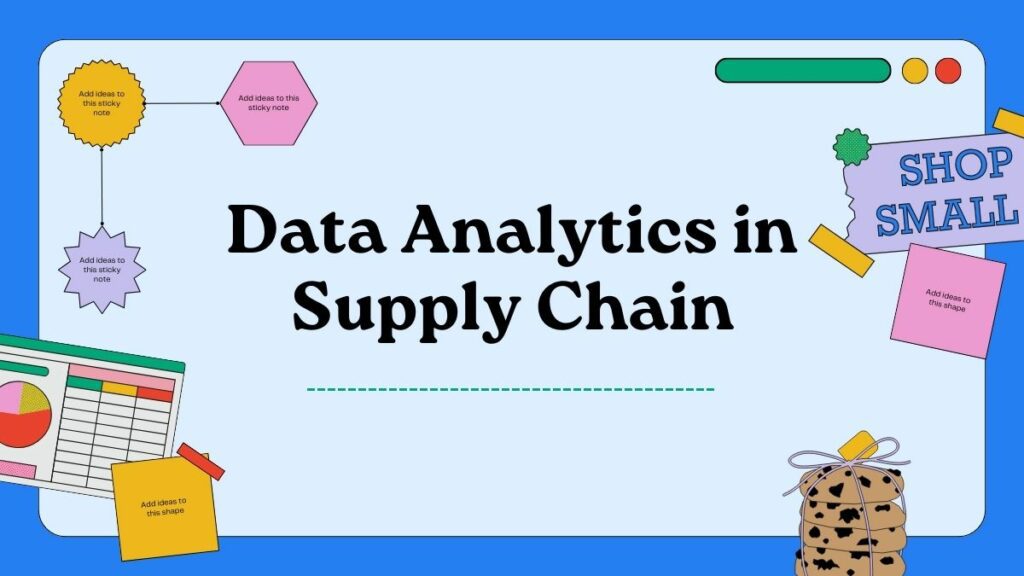With globalisation, the supply chain has become more complex, spanning different countries and industries. However, this expansion also attracts diverse challenges, from varying market trends to geopolitical changes and supplier postponements.
Managing supply chain risks is no longer a choice; it is a norm, considering the cut-throat competition shown by various investors today. This is where data analytics in supply chain operations comes into play, enabling organisations to make sound decisions quickly and accurately.
In this article, we will discuss the positive impact of data analytics on mitigating supply chain risks and tackling uncertainties with data-backed solutions.
The Evolving Landscape of Supply Chain Management
21st-century supply chain management is more than simply getting products from one place to another. It calls for a strategic management of risks, productivity and business continuity. Businesses must look out for disruption, integrate change resilience, and operate efficiently while holding costs. However, data analytics in the supply chain has a crucial role at this juncture.
Traditional demand and capacity planning methods fail to predict actual demand and supplier issues. However, with data-driven processes, organisations harness unmatched flexibility and can tackle uncertainties with greater confidence.
How Does Data Analytics Mitigate Supply Chain Risks?
Organisations use data analytics to develop coping mechanisms to avoid risks like demand fluctuation, supply disruptions or even quality-control issues. Let’s look at some key ways data analytics contributes:
1. Predictive Analytics for Demand Forecasting
Proper demand forecasting is very important if the right inventory balance is to be achieved. Forecasting is the process by which businesses identify shifts in demand from past sales data, trends and seasonality. This reduces the incidence of stock-out situations while preventing overstocking, which causes many operational inefficiencies.
For instance, an organisation dealing with e-commerce employs predictive analytics to predict high sales periods, such as during festival seasons, to organise the stock effectively in different warehouses.
2. Supplier Risk Management
The supply chain often relies on several vendors. Data analytics can help measure and evaluate these vendors’ performance based on delivery schedules, product quality, and the vendor’s financial status. By analysing such trends, companies can avoid unfavourable supply chains by changing their suppliers or figuring out contingent suppliers to deal with.
This capability helps companies prepare for shocks, such as a factory closure or a shipping delay.
3. Real-time Monitoring and Visibility
Internet of things (IoT) sensors, tracking devices and supply chain logistics systems create large volumes of real-time data in the modern supply chain. Leveraging this data, businesses can use data analytics to visualise and assess their supply chain on one singular software system, commonly referred to as a dashboard. This can enable organisations to see the whole process, from purchasing to distribution, recreated digitally.
If there are potential bottlenecks or delays, businesses can respond immediately. For example, if the product is stuck in customs, then through the help of live data, business entities could shift resources or look for a new path to take.
4. Optimising Inventory Levels
When managing inventory in the supply chain, it is essential to have the right stock available at optimal storage costs. A reorder point strategy helps determine safe inventory levels, preventing costly stock-outs or excessive holding expenses. This optimisation minimises operational risks and paves the way for long-term prosperity.
Data-driven Decision Making for Proactive Risk Mitigation
Data-driven decision-making is at the core of effective supply chain management. With data analytics, businesses gain insights that facilitate proactive rather than reactive risk responses. Instead of waiting for issues to arise, companies can forecast risks and create contingency plans.
This strategic use of data analytics promotes operational efficiency. For example, retailers can analyse weather forecasts alongside sales trends to stock their stores accordingly, avoiding losses due to incorrect inventory allocation.
The Role of Data Analytics in Enhancing Supply Chain Resilience
In today’s volatile environment, resilience is key to surviving disruptions. Businesses can enhance their adaptability by leveraging data analytics in supply chain management. Some notable benefits include:
- Scenario Planning: Data analytics models can simulate various disruption scenarios, such as raw material shortages or transportation strikes, helping companies prepare alternate plans.
- Supplier Diversification: Analytics tools identify risks related to over-dependence on a single supplier, encouraging diversified sourcing strategies.
- Improved Customer Experience: Data analytics enables businesses to communicate delays to customers proactively, maintaining trust and satisfaction despite disruptions.
Upskill with Supply Chain Management Courses
Data analytics involve professionalism, and to practise supply chain management, an organisation usually has to update its tools and methodologies professionally. Authorised supply chain management courses enable a person to acquire the aptitude for using data in supply chain analysis.
Professional Certification in Supply Chain Management and Analytics by IIT Roorkee and Imarticus is an excellent choice for those seeking to carve out a better career path in this area. This certification course can help you learn more about protecting an organisation from supply chain risks and managing uncertainties with varied tools and technologies.
Conclusion
With the current business environment rapidly changing, operating supply chains intuitively has become unprofitable. However, the growing assimilation of data analytics in operations enables companies to make proactive transitions, allowing them to become more responsive and nurture stronger supply chains.
This is why embracing big data in business leads to effective data extraction and produces methods for handling challenges effectively. Enrolling in supply chain management courses is one of the best ways to inculcate data analytics skills and strengthen your organisation’s supply chain. With the right skills and employing the right tools, all supply chain challenges can be effectively managed!

